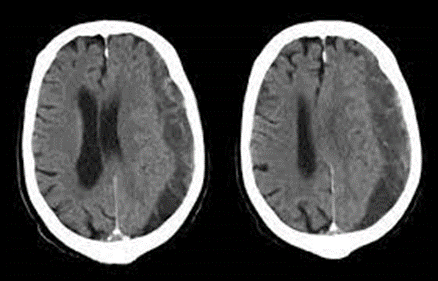A nurse is collecting data from a client who has a subdural hematoma following a motor-vehicle crash. For which of the following findings should the nurse identify that the client is experiencing an increase in intracranial pressure?
The client has a delayed response to verbal commands.
The client has ecchymosis around the eyes.
The client is unable to remember details of the motor-vehicle crash.
The client reports ringing in the ears.
The Correct Answer is A
Choice A Reason:
The client has a delayed response to verbal commands. This finding can indicate increased intracranial pressure. Changes in responsiveness, such as delayed responses to verbal commands or other stimuli, can be indicative of neurological impairment due to elevated pressure within the skull.
Choice B Reason:
The client has ecchymosis around the eyes. Ecchymosis around the eyes (raccoon eyes) can occur with certain head injuries, but it's not a direct sign of increased intracranial pressure. It's more commonly associated with basilar skull fractures rather than specifically reflecting increased pressure within the skull.
Choice C Reason:
The client is unable to remember details of the motor-vehicle crash. Memory impairment or amnesia regarding the event can occur due to head trauma, but it might not directly correlate with an increase in intracranial pressure. It's more related to the effects of the injury on memory function.
Choice D Reason:
The client reports ringing in the ears. Tinnitus or ringing in the ears might occur in some cases of head trauma but is not a direct indicator of increased intracranial pressure. It might result from the impact of the injury or other associated factors.

Nursing Test Bank
Naxlex Comprehensive Predictor Exams
Related Questions
Correct Answer is B
Explanation
Choice A Reason:
Refill the prescription every 12 months. This statement focuses on the frequency of prescription refills rather than guidance on the medication's use. While it's important to keep prescriptions up to date, this instruction doesn't directly relate to the administration or use of sublingual nitroglycerin for angina.
Choice B Reason:
Take a second tablet after 5 minutes for unrelieved chest pain. This advice is crucial because if the chest pain persists after the first tablet, taking a second tablet after 5 minutes (and seeking emergency medical assistance if pain persists after the second tablet) is part of the recommended protocol for managing unstable angina with sublingual nitroglycerin.
Choice C Reason:
Swallow the tablet whole with a glass of water. Sublingual nitroglycerin is designed to dissolve under the tongue, not to be swallowed. The medicine is absorbed through the blood vessels in the mouth to provide rapid relief for angina symptoms. Instructing the patient to swallow the tablet defeats the purpose of sublingual administration.
Choice D Reason:
Store the medication in the refrigerator. Nitroglycerin should generally be stored in a cool, dry place and away from direct sunlight, but refrigeration is not necessary. Storing it in the refrigerator might actually alter the medication's effectiveness or consistency, making it less reliable for quick absorption when needed during an angina episode.
Correct Answer is D
Explanation
Choice A Reason:
"Having a total cholesterol level below 200 mg/dl increases my risk for a stroke." This statement is incorrect. Generally, having a total cholesterol level below 200 mg/dl is considered beneficial for heart health and reducing the risk of stroke.
Choice B Reason:
"My risk for a stroke increases if my HbA1c level is 6 percent or less." This statement is incorrect. An HbA1c level of 6 percent or less is an indicator of good blood sugar control, which usually reduces the risk of stroke. A higher HbA1c level is associated with an increased risk of complications in diabetes, including stroke.
Choice C Reason:
"My provider might prescribe a glucocorticoid regimen to decrease my risk for a stroke." - Glucocorticoids are not typically prescribed to reduce the risk of stroke in individuals with diabetes. These medications may have various uses but are not a standard preventive measure for stroke in this context.
Choice D Reason:
"I can decrease my risk for a stroke by losing excess weight." This statement is appropriate. Maintaining a healthy weight is a significant factor in reducing the risk of stroke, especially for individuals with diabetes. Weight management contributes to better control of blood pressure, cholesterol levels, and blood sugar, which collectively reduce the risk of stroke.
Whether you are a student looking to ace your exams or a practicing nurse seeking to enhance your expertise , our nursing education contents will empower you with the confidence and competence to make a difference in the lives of patients and become a respected leader in the healthcare field.
Visit Naxlex, invest in your future and unlock endless possibilities with our unparalleled nursing education contents today
Report Wrong Answer on the Current Question
Do you disagree with the answer? If yes, what is your expected answer? Explain.
Kindly be descriptive with the issue you are facing.
